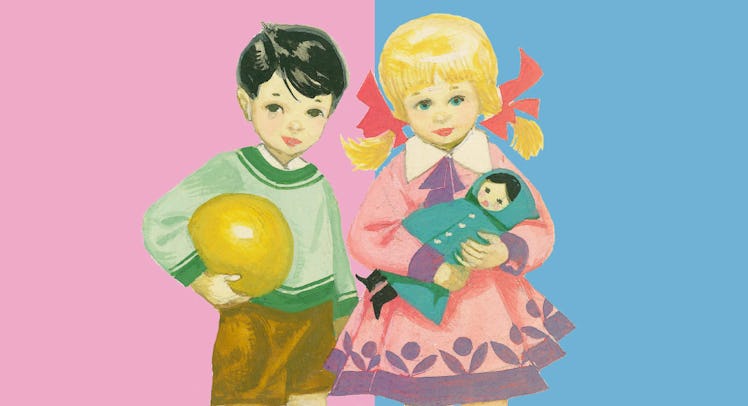A Tale of Two Princesses: My 3-Year-Old Son Vs. My 3-Year-Old Daughter
"I hope more parents can stretch and grow beyond what they were falsely taught about boys and girls growing up..."

When my son was three, he, like so many other little people, became fixated on the Disney movie Frozen. It was all he wanted to watch, the only music he wanted to listen to, and he desperately wanted to dress up as Anna, one of the main characters from the film, for Halloween.
After some hand-wringing and worrying, we bought him the Anna costume, which he ultimately didn’t like because it was scratchy against his skin. This would be the first of many moments when our son would challenge me and my husband to reconsider what clothing, behavior, and toy selections we considered appropriate for boys and for girls and expand our thinking beyond traditional gender norms. It was a gift.
As parents, we had to have several hard conversations and unfortunately, we made several missteps. But ultimately, we came to agree that moving forward we would always celebrate our son’s self-expression, no matter if those choices fell outside traditional gender norms, and no matter if those choices were made in private or in public.
Over time, our son’s love of glitter, hair accessories, and princesses has begun to fade. He’s now five and peer influence is certainly a factor at play. His younger sister, however, just turned three and is entering her own love affair for all things princess. Before now, she gravitated toward traditionally masculine toys and clothing. Over the summer, she started to prefer dresses, which proved problematic since she only had one. Then she saw an image of Cinderella on a pull-up and life has never been the same.
I find myself yet again struggling to accept my daughter’s delight in Cinderella and other princesses she’s been exposed to at friends’ houses and toy stores, but my reasons this go around are for completely different reasons. With my son, I worried about how the world would receive him; that he would be teased and hurt. With my daughter, I worry that she is falling into the traditional narrative spun for girls and I want to empower her to know she doesn’t need saving from any prince.
I know in both instances, my worries stem from my own life experiences and world views and it’s unfair to place that on my kids. The root of my children’s interest in princesses largely comes from the fabulous dresses, the magic, and the catchy songs. Through more conversations with friends and family, I agreed I needed to support my daughter’s infatuation with princesses, but I continued to disrupt the problematic racist and sexist imagery.
But just as there was a difference in how my daughter was received when she wanted to dress up like Darth Vader for Halloween vs. my son who wanted to go as Anna years before, there is also a huge difference in how her love of princesses is playing out.
For my son, many people I knew shared our worry for how he’d be received in public if he wore the Anna costume, fueling my own anxiety. Only immediate family gave him Frozen-themed presents during the holidays and even then many of those gifts featured the male characters. For my daughter, however, she was just inundated with princess gear for her birthday. This bothers me and reinforces that while I should support her interests, I need to stay vigilant in order to make sure she’s exposed to other toys and narratives.
I take pride in the fact that both of my kids play fluidly with toys that are outside their traditional gender norms. But this takes a lot of work on our part as parents. We hammer home that there is no such thing as a color or a toy or an article of clothing or a behavior that’s only “for a boy” or “for a girl”. We want both of our children to paint their nails if they want to; to play in the dirt if they want to; to wear dresses if they want to; to wrestle if they want to.
I must admit, however, I find myself giving my kids extra encouragement in the moments they choose to step outside of their traditional gender norms. I do this to counteract the messages they are receiving at school, on TV, and in the world. It’s a tough balance to strike and I’m sure I don’t always get it right. I just cringe knowing how much influence our society has on kids.
My hope for my children — and all children for that matter — is that they feel supported throughout their journey in discovering who they are and that they feel loved no matter what. I hope we can smash the gender binary and help our kids feel empowered to make choices regardless of their assigned gender at birth. I hope more parents can stretch and grow beyond what they were falsely taught about boys and girls growing up in order to better support all kids, whether they are their own or not.
This article was syndicated from Striving Parent.
This article was originally published on